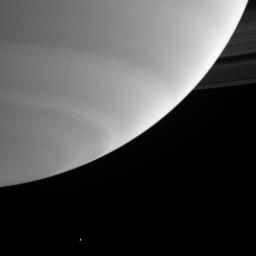Enceladus in the Distance
Caption:
Cassini spied the moon Enceladus in the distance beyond Saturn's south pole in this image from Sept. 19, 2004.
This view was taken in wavelengths of ultraviolet light where gas molecules in Saturn's high atmosphere scatter a great deal of sunlight. Since Enceladus (499 kilometers, or 310 miles, across) has an unusually high reflectivity, its surface reflects even more of the light falling on it than Saturn does, making the moon appear very bright compared the planet. Enceladus was dimmed in brightness by a factor of three during processing of the image, in order to make its brightness comparable to that of Saturn.
The image was taken with the Cassini spacecraft narrow angle camera at a distance of 8.3 million kilometers (5.2 million miles) from Saturn. The image scale is 49 kilometers (30 miles) per pixel.
Background Info:
The Cassini-Huygens mission is a cooperative project of NASA, the European Space Agency and the Italian Space Agency. The Jet Propulsion Laboratory, a division of the California Institute of Technology in Pasadena, manages the Cassini-Huygens mission for NASA's Science Mission Directorate, Washington, D.C. The Cassini orbiter and its two onboard cameras were designed, developed and assembled at JPL. The imaging team is based at the Space Science Institute, Boulder, Colo.
For more information, about the Cassini-Huygens mission visit,
http://saturn.jpl.nasa.gov
and the Cassini imaging team home page,
http://ciclops.org
.
Cataloging Keywords:
| Name |
Value |
Additional Values |
| Target |
Enceladus |
Saturn |
| System |
Saturn |
|
| Target Type |
Satellite |
Planet |
| Mission |
Cassini-Huygens |
|
| Instrument Host |
Cassini Orbiter |
|
| Host Type |
Orbiter |
|
| Instrument |
Imaging Science Subsystem (ISS) |
|
| Detector |
Narrow Angle Camera |
|
| Extra Keywords |
Atmosphere, Grayscale, Ultraviolet, Visual |
| Acquisition Date |
|
| Release Date |
2004-11-03 |
| Date in Caption |
|
|
| Image Credit |
NASA/JPL/Space Science Institute |
| Source |
photojournal.jpl.nasa.gov/catalog/PIA06512 |
| Identifier |
PIA06512 |

 Planetary Data System
Planetary Data System
